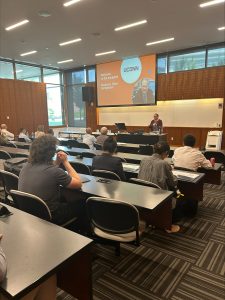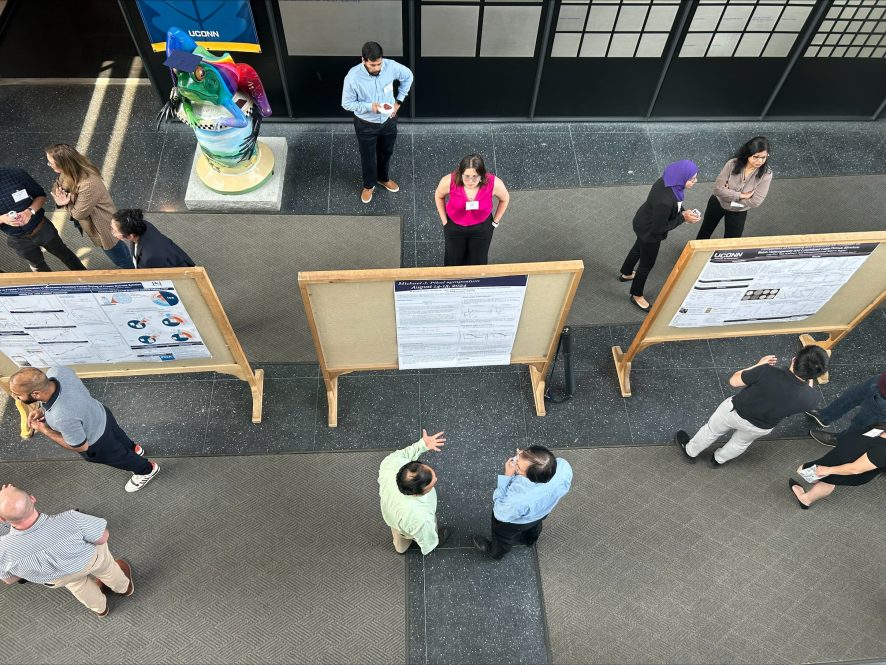The event highlighted advancements and challenges in freeze-drying, a process essential for preserving life-saving drugs.
Freeze-drying, or lyophilization, is a method that turns pharmaceutical solutions, such as vaccines and injectable medications, into powders. This helps preserve them for longer periods, making them easier to store and transport.
“It’s important for us to get the right drugs to patients. A lot of antibiotics couldn’t be made into injectable solutions unless they were freeze-dried,” says Robin Bogner, a professor of pharmaceutics at UConn and colleague of Pikal. “It’s about making sure that drugs are accessible to patients.”
Freeze-drying is crucial for otherwise unstable drugs, so they can be stored and transported to patients across the country and the world.
“One example is the covid vaccine,” said Xiuling Lu, who is also a professor of pharmaceutics at UConn and colleague of Pikal. “You have to freeze the covid vaccine in a very, very cold freezer,” Lu says.
By freeze-drying, vaccines and other sensitive pharmaceuticals can be stabilized, making them easier to store and transport at reasonable temperatures while reducing the risks associated with temperature fluctuations.
The symposium, officially known as the Michael J. Pikal Symposium, was established to honor Pikal’s contributions to this field.
“Dr. Pikal was a colleague of ours who specialized and was known worldwide in the area of pharmaceutical freeze drying. So, to honor him, we decided to hold this symposium every other year,” Bogner said. Pikal’s work enabled deep understanding of freeze-drying process, smart freeze-drying to streamline the process optimization and control and effective drying through in-line monitoring.
“We wanted to have this first symposium as a means to remember our colleague’s contribution and then bring our current research forward to exciting advancement and breakthrough,” Lu said.
In addition to recognizing Pikal’s work, the symposium also serves as a platform for sharing new research and reconnecting with experts in the field. “We were able to gather very important researchers in this area for the conference,” Lu said.
Students and postdocs trained at UConn have played a significant role in advancing freeze-drying research. The symposium brought them back to campus not only to present their research but also to interact with colleagues and students in the department. This created opportunities for communication, networking and encouraged reconnection.
“We’re always trying to reconnect with our alumni,” Bogner said.
Even with its benefits, freeze-drying has its challenges. “In this area, for sensitive proteins and mRNA or other entities, it’s not a simple process. It could even cause a loss in potency if the process is not well controlled,” Lu said. This highlights the importance of carefully handling sensitive drugs during freeze-drying. If the conditions aren’t properly monitored, the freeze-drying process can weaken these products, potentially leading to treatment failures.

The symposium also highlighted the life and legacy of Dr. Pikal, who passed away in 2018, a month after retiring. His wife, Janice, passed away two years later. Michael J. and Janice L. Pikal Fellowship was established to supports graduate students studying pharmaceutical technology at UConn. This fellowship ensures that his passion for research and education continues. Proceeds from the symposium went toward the Michael J. and Janice L. Pikal Fellowship.
The event featured presentations from leading researchers, including keynote speaker Steven L. Nail, a distinguished expert in pharmaceutical freeze-drying. Nail, a former Senior Research Scientist at Baxter Biopharma Solutions and a Fellow of the American Association of Pharmaceutical Scientists, discussed the evolution of freeze-drying technology and its implications for the future of pharmaceutical development.
The symposium also brought together experts from major research institutes, universities and pharmaceutical companies to present their latest research findings. Attendees from more than 25 entities engaged in meaningful discussions aimed at advancing knowledge and innovation in freeze-drying processes.
The symposium was sponsored by several major Pharmaceutical companies and specialty companies including AstraZeneca, Lilly, Merck, Pfizer, ATS Scientific Products, Millrock Technology, Lyonavigator, and Tempris.
The symposium, which will be held every other year around Pikal’s birthday in August, is already inspiring further advancements in the field. Attendees were encouraged to submit their research to a special issue dedicated to freeze-drying technologies in AAPS Open, a major pharmaceutical journal.



